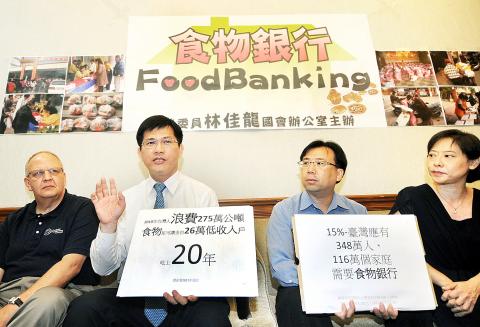Lawmakers are proposing an amendment to the Public Assistance Act (社會救助法) and the establishment of a national food bank to help 260,000 low-income households nationwide.
“If the legislation is passed, Taiwan will become the 22nd country with a food bank network,” Democratic Progressive Party (DPP) Legislator Lin Chia-lung (林佳龍) told a press conference yesterday.
The proposed amendment to Article 11 of the act would provide the government with a legal basis to help those in need with resources other than a cash subsidy, Lin said.

Photo: Fang Pin-chao, Taipei Times
US Department of Agriculture statistics show that more than 46 million Americans, or about 15 percent of the US population, lived on assistance provided by food banks last year, Lin said.
If the same percentage were applied to Taiwan, about 3.5 million people would need similar assistance, Lin said.
Statistics compiled by the Environmental Protection Administration show that Taiwanese in 2010 wasted 2.75 million tonnes of food, the equivalent of 20 years of -consumption by 260,000 low-income households, Lin said.
“If established, the food bank network would be part of an improved social security net,” Lin said.
A local food bank in Greater Taichung set up by several civic groups has helped more than 20,000 people, said Chen Chieh-fu (陳玠甫), director of the Red Cross Society of Taiwan’s Taichung branch.
However, awareness and knowledge of food banks have to be promoted so that those in need would know where and how to seek help, he said.
With appropriate legislation, donors would be assured that the donation will not be mishandled.
Craig Nemitz, the Global FoodBanking Network’s Director of Field Services, told the press conference that he would love to help Taiwan establish a national food bank, which he said would have a positive impact on social welfare policy.

Chinese spouse and influencer Guan Guan’s (關關) residency permit has been revoked for repeatedly posting pro-China videos that threaten national security, the National Immigration Agency confirmed today. Guan Guan has said many controversial statements in her videos posted to Douyin (抖音), including “the red flag will soon be painted all over Taiwan” and “Taiwan is an inseparable part of China,” and expressing hope for expedited reunification. The agency last year received multiple reports alleging that Guan Guan had advocated for armed reunification. After verifying the reports, the agency last month issued a notice requiring her to appear and explain her actions. Guan

GIVE AND TAKE: Blood demand continues to rise each year, while fewer young donors are available due to the nation’s falling birthrate, a doctor said Blood donors can redeem points earned from donations to obtain limited edition Formosan black bear travel mugs, the Kaohsiung Blood Center said yesterday, as it announced a goal of stocking 20,000 units of blood prior to the Lunar New Year. The last month of the lunar year is National Blood Donation Month, when local centers seek to stockpile blood for use during the Lunar New Year holiday. The blood demand in southern Taiwan — including Tainan and Kaohsiung, as well as Chiayi, Pingtung, Penghu and Taitung counties — is about 2,000 units per day, the center said. The donation campaign aims to boost

The Kaohsiung Tourism Bureau audited six hotels in an effort to prevent price gouging ahead of Korean band BTS’ concert tour in the city scheduled for Nov. 19, 21 and 22 this year. The bureau on Friday said that the audits — conducted in response to allegations of unfair pricing posted on social media — found no wrongdoing. These establishments included the local branches of Chateau de Chine, Hotel Nikko, My Humble House, and Grand Hai Lai, it said, adding that the Consumer Protection Commission would have penalized price gougers had the accusations been substantiated. The bureau said the Tourism Development Act

A preclearance service to facilitate entry for people traveling to select airports in Japan would be available from Thursday next week to Feb. 25 at Taiwan Taoyuan International Airport, Taoyuan International Airport Corp (TIAC) said on Tuesday. The service was first made available to Taiwanese travelers throughout the winter vacation of 2024 and during the Lunar New Year holiday. In addition to flights to the Japanese cities of Hakodate, Asahikawa, Akita, Sendai, Niigata, Okayama, Takamatsu, Kumamoto and Kagoshima, the service would be available to travelers to Kobe and Oita. The service can be accessed by passengers of 15 flight routes operated by